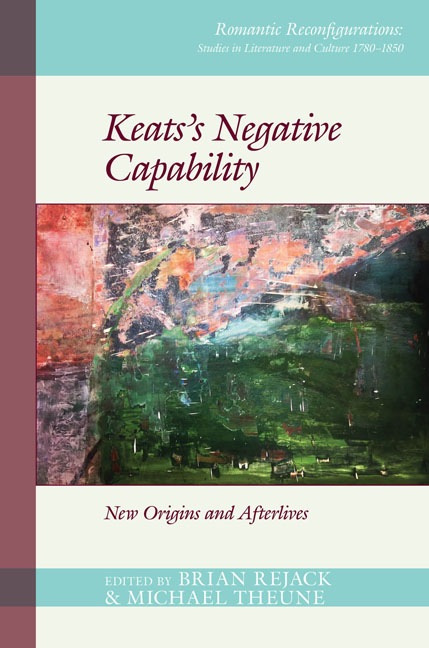Book contents
- Frontmatter
- Contents
- List of Figures
- Acknowledgments
- List of Abbreviations
- List of Contributors
- Preface
- Introduction: Disquisitions: Reading Negative Capability, 1817–2017
- Part I ‘swelling into reality’: New Contexts for Negative Capability
- Part II ‘examplified throughout’: Forms of Negatively Capable Reading
- Part III ‘pursued through Volumes’, Volume I: Negative Capability in Twentieth- and Twenty-First-Century American Poetry
- Part IV ‘pursued through Volumes’, Volume II: Adaptations, Appropriations, Mutations
- Afterword: Reading Keats's Negative Capability
- Bibliography
- Index
Afterword: Reading Keats's Negative Capability
- Frontmatter
- Contents
- List of Figures
- Acknowledgments
- List of Abbreviations
- List of Contributors
- Preface
- Introduction: Disquisitions: Reading Negative Capability, 1817–2017
- Part I ‘swelling into reality’: New Contexts for Negative Capability
- Part II ‘examplified throughout’: Forms of Negatively Capable Reading
- Part III ‘pursued through Volumes’, Volume I: Negative Capability in Twentieth- and Twenty-First-Century American Poetry
- Part IV ‘pursued through Volumes’, Volume II: Adaptations, Appropriations, Mutations
- Afterword: Reading Keats's Negative Capability
- Bibliography
- Index
Summary
Keats's Negative Capability dwells in uncertainty. I do not mean this as a criticism, but rather as a measure of the book's attention to how negative capability has invoked so many precursors, taken on so many valences, and set in motion so many trajectories that one almost despairs of obtaining even half knowledge of what it all means. ‘Almost’ is an important word here, though, for through the space marked by that almost the book's sixteen authors mobilize their array of approaches to Keats's kerygmatic formulation. Keats, as we know, has the capacity to elicit atypical scholarly engagements. Witness, to begin, the longing that suffuses Brian Rejack's essay, when he writes of the missing original manuscript of the ‘negative capability letter’. Circling around Rejack's rigorous archival tracing and productive historical speculations, there is an affect that runs something like ‘if we could only find the letter … but perhaps it is best if we don't … but truly it would be great if we did … ‘. (That Rejack recognizes this oscillation is a fundamental strength of his essay.) One notes similar desires surfacing throughout the volume, such that the insufficiency of traditional scholarly apparatus in the face of negative capability becomes a defining trait of the group's collective endeavor. The overall mood that the essays create, Romantic itself, in turn shapes the reader's thoughts on what the book must leave out because its critical object displays a palpable Keatsian elusiveness. Negative capability is rendered variously as a theatrical aesthetic mixing (Bates); a philosophical echo of Hazlitt's ‘natural capacity’ (Theune) or Coleridge's ‘negative faith’ (Reed); a named or unnamed mode of receiving the literary past (Mathes) or disciplinary past (Eisner, Hessel); a conception of the future that opens the present to its effects (Rohrbach); a foregrounding of bodily sensation (Britton, Gardner); a postmodern ‘transmigration of consciousness’ (Reed); a movement toward the world's concrete materiality (Seyran); a measure of its ‘everyday saturation’ (Falke); a clinical refusal of memory (Sigler); an unspoken parallel of Eastern askesis (McCarthy); a belated return to Romantic self-annihilation (Barnett); a means of mapping the progress of literary history (Archambeau). Always in the background haunting these renderings is the long-presiding figure of W. J. Bate's midcentury Keats: manly, mobile, disinterested.
- Type
- Chapter
- Information
- Keats's Negative CapabilityNew Origins and Afterlives, pp. 259 - 262Publisher: Liverpool University PressPrint publication year: 2019



